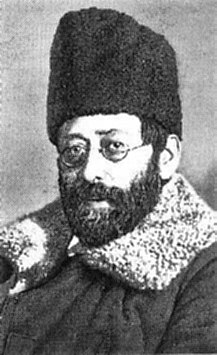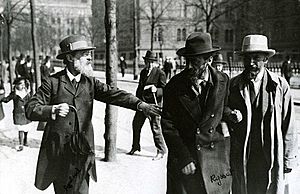Julius Martov facts for kids
Quick facts for kids
Julius Martov
|
|
|---|---|
 |
|
| Born |
Yuliy Osipovich Tsederbaum
24 November 1873 |
| Died | 4 April 1923 (aged 49) Schömberg, Republic of Baden, Weimar Republic
|
Julius Martov (born Yuliy Osipovich Tsederbaum; 24 November 1873 – 4 April 1923) was an important politician and revolutionary in early 20th-century Russia. He became a leader of the Mensheviks, a group of socialists. Martov was a close friend of Vladimir Lenin and a mentor to Leon Trotsky. Trotsky once called him the "Hamlet of Democratic Socialism" because of his thoughtful and sometimes hesitant nature.
Contents
Early Life and Activism
Martov was born in Constantinople, which is now Istanbul, Turkey. His family was Jewish, educated, and interested in politics. He grew up in Odessa, Russia. As a student, he sometimes faced difficulties because he was Jewish.
When he was a teenager, Martov admired the Narodniks, a group that wanted to help Russian peasants. But after a big famine in Russia in 1891-1892, he became a Marxist. Marxism is a political and economic theory that focuses on class struggle and revolution. He realized that his earlier ideas were not as deep as Marxism.
First Arrests and Exile
In February 1892, Martov was arrested for speaking out against the Tsar, who was the emperor of Russia. He was held in prison until May. Later that year, he started studying at St. Petersburg University. He joined a Marxist group there and was soon expelled and arrested again.
Instead of moving to the United States, as his grandfather suggested, Martov chose to be exiled for two years in Vilna (now Vilnius, Lithuania).
Working with Jewish Workers
In Vilna, Martov worked with the Jewish Bund. This group aimed to organize Jewish workers. With a friend named Arkady Kremer, Martov wrote a paper called On Agitation (1895). This paper explained how to encourage workers to go on strike and demand better conditions. At that time, trade unions were not allowed in Russia. Martov even learned some Yiddish to connect with Jewish workers.
Forming the League of Struggle
Martov returned to St. Petersburg in 1895. He helped create the League of Struggle for the Emancipation of the Working Class. Vladimir Lenin was also a key figure in this group. Martov and Lenin were very close friends then, even though they had different personalities. Lenin was organized, while Martov was more lively and sometimes a bit messy. Martov worked to connect with factory workers, especially at the Putilov factory, until he was arrested again in January 1896.
Martov was sent away for three years to a very cold place called Turukhansk in the Arctic. Lenin was sent to a warmer part of Siberia. After his exile, Martov joined Lenin in Pskov. They planned to go abroad and start a newspaper to help organize the scattered Marxist groups into one strong political party.
Life in Exile and the Iskra Newspaper
Martov left Russia and settled in Munich, Germany. He joined the Russian Social Democratic Labour Party (RSDLP). He also helped start the party's newspaper, Iskra (meaning "Spark"). At first, Martov and Lenin worked closely together on the newspaper.
When Iskra moved to London in 1902, Martov lived with another Marxist, Vera Zasulich. They lived near Lenin and his wife, Nadezhda Krupskaya. While Lenin worked at the British Museum, Martov and Krupskaya did much of the daily work for Iskra. Some people believe that the differences between Martov and Lenin started to grow during this time.
The Big Split: Mensheviks and Bolsheviks
A major disagreement happened before the 2nd Congress of the RSDLP in 1903. Martov and Lenin had different ideas about who should be a party member. Martov believed that anyone who supported the party's goals and followed its leaders should be a member. Lenin, however, wanted the party to be smaller and more disciplined, with members actively working in party organizations.
When the Congress began in London, Lenin and Martov agreed on many things. But during a vote on party membership, Lenin's idea was voted down. Later, some delegates left the Congress, which gave Lenin's supporters a majority. From then on, Lenin's group called themselves the Bolsheviks (meaning "majority"), and Martov's group became the Mensheviks (meaning "minority").
This split between Bolsheviks and Mensheviks became permanent. Martov became a leading figure among the Mensheviks.
Martov's Personality
Many people described Martov as a brilliant thinker. He was known for his honesty and his deep, philosophical way of looking at politics. He chose his political friends based on their ideas, not always on what was practical.
However, some also said that Martov's noble principles made him too "soft" and "indecisive" for the tough world of revolutionary politics.
Even after their big split, Lenin still spoke kindly about Martov. He once told writer Maxim Gorky, "I am sorry, deeply sorry, that Martov is not with us. What a splendid comrade he is."
Revolutionary Activities
Martov was in exile when the 1905 Revolution began in Russia. He believed that revolutionaries should strongly oppose the new government. He suggested that different groups like trade unions and workers' councils should work together to challenge the government.
He returned to Russia in October 1905 but was arrested again. After being released, he helped organize the RSDLP group in the First Duma (a Russian parliament). He was arrested again and eventually settled in Paris.
Martov was always on the more radical side of the Mensheviks. He supported reuniting with the Bolsheviks in 1905, but this unity did not last long.
World War I
When First World War started in 1914, Martov saw it as a war driven by powerful countries trying to gain more control. This was similar to what Lenin and Trotsky believed. Martov became a key leader of the Mensheviks who opposed Russia's involvement in the war. He also helped start a newspaper called Nashe Slovo ("Our Word").
The February and October Revolutions
In 1917, the February Revolution happened in Russia, overthrowing the Tsar. Martov was in Zurich, Switzerland, with Lenin. Martov had the idea of exchanging Russian revolutionaries in exile for German citizens held in Russia. This plan helped many Russian leaders, including Lenin, return home. Martov, however, waited and did not join Lenin on the famous "sealed train" across Germany. He returned to Russia later, in May 1917.
Martov arrived too late to stop some Mensheviks from joining the new Provisional Government. He strongly criticized Mensheviks who supported Russia's continued involvement in the war. He tried to get support for immediate peace talks, but he failed. He also couldn't form an alliance with Lenin, even though many of his supporters thought it was the logical thing to do.
After the Bolshevik Takeover
When the Bolsheviks took power in the October Revolution of 1917, Martov became less important politically. At a meeting of the Soviets (councils of workers and soldiers) right after the Bolsheviks seized power, Martov called for a "united democratic government" involving all parties. He believed this was the only way to avoid a civil war. His idea was popular with many, but Trotsky strongly disagreed. Trotsky famously told Martov and others who were leaving the meeting in protest: "You are pitiful isolated individuals; you are bankrupts; your role is played out. Go where you belong from now on—into the dustbin of history!"
Martov led the Menshevik opposition group in the Russian Constituent Assembly, a parliament that the Bolsheviks later shut down.
Civil War and Final Years
During the Russian Civil War, Martov supported the Red Army against the White Army. However, he continued to speak out against the Bolsheviks' harsh treatment of political opponents, including other socialists and newspapers.
In October 1920, Martov was allowed to leave Russia and go to Germany. He spoke at a conference there. He had not planned to stay in Germany forever, but he did so after the Mensheviks were made illegal in Russia in March 1921.
Martov died in Schömberg, Germany, in April 1923. Before he became very ill, he started a newspaper called Sotsialisticheskiy vestnik ("Socialist Courier"). This newspaper continued to be published by Mensheviks living in exile for many years.
Works in English
- Julius Martov, "The Lesson of the Events in Russia", Le Socialisme, 29 December 1907;
- The State and the Socialist Revolution (1938, New York) (1977, London), Trans. Herman Jerson
- Yuliy Osipovich Martov, "Down with the Death Penalty!", June/July 1918;
- What is to be done? (July 1919, Mensheviks);
- Julius Martov, "The Ideology of «Sovietism»", First published in Mysl', Kharkov 1919;
- Julius Martov, "Decomposition or Conquest of the State", Introductory section published in Sozialisticheski Vestnik (Berlin) 8 July & 1 September 1921; the whole article appeared for the first time in Mirovoi Bolshevism, Berlin 1923;
- Martov and Zinoviev: Head to head in Halle (2011, London) November Publications
See also
 In Spanish: Yuli Mártov para niños
In Spanish: Yuli Mártov para niños
 | Valerie Thomas |
 | Frederick McKinley Jones |
 | George Edward Alcorn Jr. |
 | Thomas Mensah |


